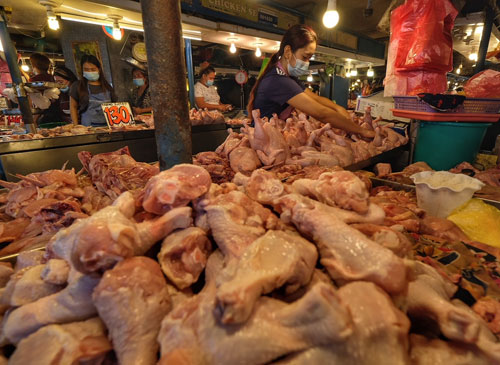Describing the food crisis as a pandemic, outgoing Agriculture Secretary William Dar has offered to the next administration recommendations that can address this problem.
This developed as incoming Socioeconomic Planning secretary Arsenio Balisacan yesterday said there is already a food crisis in the Philippines.
Dar said with no less than the incoming president of the country acting as secretary of the Department of Agriculture, the sector is assured of the highest priority and increased budget.
“…There is this global food crisis. More than 20 countries have now made restrictions on the exports of their food products and the lingering war in Ukraine continues. There is really a major disruption in the food supply chain and this is a big, big problem. If I have to equate this, this is like a pandemic as well,” said Dar, in a briefing yesterday.
Dar said a balanced fertilization strategy coupled with the provision of fertilizer subsidies to local rice, corn and vegetable farmers is the most important intervention that will immediately keep food production at a “good level.”
Dar also called on the need to improve animal feeds production, but that it has to be supported by enough local raw materials.
Dar also recommended to the next administration to further promote urban agriculture especially in provinces that are not visited by typhoons such as Palawan, Iloilo and Bukidnon.
Dar said focus should be given to aquaculture and mariculture fisheries through the massive production of fingerlings to mitigate the supply of fish in the market.
He also called for the mobilization of food items from areas with surplus to areas that need the produce to help stabilize prices.
Dar said all these plans have been laid out in the past but have yet to be fully implemented due to lack of budget.
“We are heartened by the statement of the President, placing agriculture as top governance and budgetary priority. Thus, we expect to see bigger budget for the DA in the years to come…,” Dar added.
Balisacan, who is also the National Economic and Development Authority head, said in an interview with CNN Philippines the agriculture sector is in crisis, with soaring prices of basic food products such as rice and meat, as well as the low profitability in farming.
He said the country is also still reeling from the effects of the avian flu which has led to price increases of meat.
He said the price of rice has also been increasing despite the tariffication.
“Food prices have risen,” he said, adding this could continue in the coming months as countries exporting agricultural products are considering adjusting the quantity of the products that they will export and prioritizing their citizens.
Balisacan said the Philippines is planning to raise production to cushion the impact of the lower amount of imports such as rice.
At the Pandesal Forum yesterday, flour millers called for tariff cuts on raw materials that go on bread making and clamored for an increase in the volume of corn that can be imported at preferential tariff.
The twin moves would ensure lower prices of bread and meats, amid a gloomy projection of rising prices of grains, according to Ric Pinca, executive director of the Philippine Association of Flour Millers.
Pinca said while wheat is now at zero tariff, its price which has doubled from $250 per metric ton (MT) before the Russia-Ukraine war to $500 to $550, will continue to increase as the conflict rages on.
Pinca said other factors continue to influence wheat prices: India and China’s ban on export; the drought experienced in wheat growing areas in the US from which the Philippines secures 90 percent of its supply; increase in freight costs to as much as $55 per MT from $25 and the weakening peso to the dollar at 53 from 47 last year.
Pinca said tariff cut on other bread ingredients like yeast, shortening and others would help balance the cost of flour which gone up to P900 to P1,000 per bag from just P860 prior to the Russia-Ukraine crisis.
On feeds, Pinca said the volume of imports entitled to 5 percent preferential tariff on corn under the minimum access volume should be increased from 250,000 MT set for 2022. (With Jocelyn Montemayor and Irma Isip)




